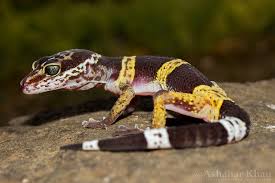GECKO SATPURA LEOPARD GECKO (Eublepharis hardwickii)
$200.00
Full Description
Here’s a detailed care guide for the Satpura Leopard Gecko (Eublepharis cf. hardwickii), a rare and distinct gecko species endemic to the Satpura Range of central India. This species is still under scientific scrutiny and may eventually be elevated to full species status separate from Eublepharis hardwickii. As such, captive care is not well-documented, and only experienced keepers should attempt to keep this species.
Satpura Leopard Gecko Care Guide
(Eublepharis cf. hardwickii – possibly undescribed or cryptic species)
Species Overview
-
Common Name: Satpura Leopard Gecko
-
Scientific Label: Eublepharis cf. hardwickii
-
Origin: Satpura Hills, Madhya Pradesh, India
-
Size: 6–8 inches (15–20 cm)
-
Lifespan: Likely 10–15+ years in captivity
-
Temperament: Secretive, easily stressed
-
Experience Level: Advanced/expert keepers only
️ Natural Habitat Snapshot
-
Region: Deciduous forest edges, hills, and leaf-littered terrain
-
Climate: Warm, moderately humid, with seasonal monsoon rains
-
Behavior: Crepuscular/nocturnal, ground-dwelling, burrowing
Enclosure Setup
| Feature | Recommendation |
|---|---|
| Enclosure Size | Minimum 30-gallon long or 24x18x12″ for 1 adult |
| Enclosure Type | Terrestrial, secure top, front-opening preferred |
| Substrate | Bioactive or naturalistic: coco fiber, soil, leaf litter |
| Décor | Bark, logs, rocks, plants, mossy hides |
| Hides | At least 3: warm, cool, humid |
| Lighting | Low-level UVB (5.0 T5 tube) encouraged |
| Water | Shallow clean water dish; misting 1–2x/day |
️ Temperature & Humidity
| Zone | Range |
|---|---|
| Warm Side | 82–86°F (28–30°C) |
| Cool Side | 72–76°F (22–24°C) |
| Night Temp | 68–72°F (20–22°C) |
| Humidity | 50–70% ambient; 80%+ in humid hide |
-
Use an under-tank heater or radiant heat panel on a thermostat.
-
Mist lightly in the evening to simulate dusk activity periods.
️ Diet & Feeding
| Category | Info |
|---|---|
| Diet | Insectivorous |
| Staple Prey | Crickets, dubia roaches, black soldier fly larvae |
| Occasional | Silkworms, mealworms, hornworms |
| Supplements | Calcium (every feeding), D3 (2x/week), multivitamin (1x/week) |
| Feeding Schedule | Adults: 3–4 times/week; Juveniles: daily |
-
Feed in the evening for better feeding response.
-
Gut-load all feeders for at least 24 hours before feeding.
Behavior & Temperament
-
Shy and reclusive, especially during the day
-
Tends to burrow or hide under cover
-
Not handle-friendly—interaction should be minimal
-
Solitary: do not house with others
Cleaning & Maintenance
-
Spot-clean daily
-
Deep clean monthly (or monitor closely if bioactive)
-
Ensure proper shed support with humid hide
-
Watch for:
-
Retained shed on toes/tail
-
Lethargy or stress (often due to improper humidity)
-
Poor appetite in improper temperature ranges
-
✅ Supplies Checklist
-
30-gallon or larger terrarium
-
Moisture-retaining natural substrate
-
Hides (warm, cool, humid)
-
Digital hygrometer and thermostat
-
Low-output UVB lighting (encouraged)
-
Feeding tongs and gut-loaded insects
-
Misting bottle or fogger
-
Calcium + D3 and multivitamin powder
⚠️ Conservation & Legal Note
-
This species may be protected or of uncertain legal status in India.
-
Only acquire captive-bred individuals from ethical, legal sources.
-
Avoid wild collection to prevent ecological impact.

